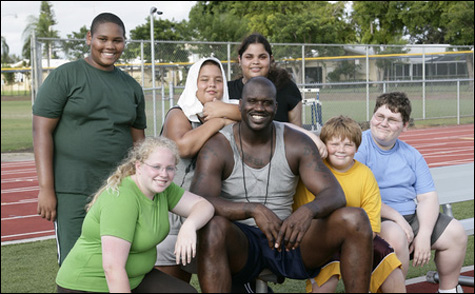
FAT ATTACK: Will the kids slim down? Will Shaq resolve his good-cop-bad-cop persona? |
Say this for Miami Heat center Shaquille O’Neal: in Shaq’s Big Challenge (ABC, Tuesday at 9 pm) — his televised jihad against childhood obesity — signs abound that his intentions are good. Start with the simple fact of the show’s existence: during an era in which most pro athletes demonstrate zero social conscience, O’Neal is addressing a legitimate public-health threat. Good for him.
More striking, though, is the sensitivity Shaq displayed during the show’s June 26 debut, in which he made home visits to each of his plump protégés. After James (11 years old, 182 pounds) pointed out the neighborhood bully, Shaq called the bad guy over and politely told him not to mess with his friend; it was a moving scene. And when Chris — a 206-pound 11-year-old — cried while recounting his social travails, Shaq actually looked to be fighting back tears himself.
Is this sympathy or empathy? Thus far, O’Neal hasn’t actually copped to being an ex-fattie. But there are repeated hints (Shaq arguing the merits of Boston-cream and French-cruller doughnuts with James and admitting that he too used to put fries on his burgers) that such a confession is in the offing. Whatever Shaq’s childhood girth, the show does suggest that he was an unhappy youth — as he tells one depressed (and very fat) young man during a visit to a Florida middle school, “I didn’t get my first Valentine’s Day card until I went to college. Elementary school, middle school, high school, nobody liked me.”
So what’s the problem? Shaq’s jarring switch from good cop to bad cop, that’s what. The first episode closed with O’Neal putting his six subjects on a voluntary, unsupervised fitness regimen — then flipping out after his personal trainer, Dr. Carlon Colker, made a surreptitious visit and found the kids fucking off instead of getting fit. (Imagine that!)
Fast-forward to the July 3 episode, which begins with Shaq confronting his recruits about their alleged duplicity — “I can’t help you out no more, ’cause you let me down” — and introducing the show’s designated bad guy, a personal trainer named Tariq Tyler, who, as James observes, “looks like Mr. T, but not as strong and uglier.” Tyler promptly launches his embarrassed, terrified wards into an intense series of drills. Two minutes later, Kit — a 14-year-old goth girl who weighs a whopping 263 pounds — starts hyperventilating, collapses on the gym floor, and retches. An ambulance comes. Later, we’re told that Kit’s vital signs were fine and that it was just an anxiety attack. Kit drops out.
After this ugly scene, Shaq, Colker, and Tyler have a heated confab: Shaq is painted as the worried softie, Colker and Tyler as the tough guys. Still, it’s awfully hard not to point a finger at the Big Aristotle himself. Yes, yes, reality TV thrives on synthesized, exploitative drama. But the subjects here aren’t the washed-up celebrities of The Surreal Life or the arrogant exhibitionists of Survivor; they’re six profoundly vulnerable tweens. Even by the loose standards of the genre, this cruel bait-and-switch goes too far — which, I admit, made it fascinating to watch.